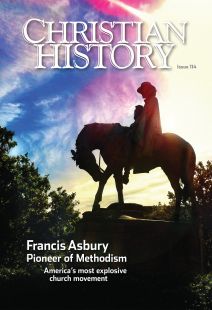The continent was their parish
CH: What stamp did Asbury leave on American religion?
Russell Richey: Asbury modeled a very distinctive leadership style: popular, affirming, energetic, accessible, and accountable. He effectively claimed Wesley’s Arminian theological system, focused on lived religion, not refined doctrinal discussion. It was Scripture-based and hymn-sung and proclaimed the human ability to respond to God’s grace. Asbury focused Methodism on evangelistic doctrines, practices, lifestyle, and purpose.
He and his fellow preachers lived within the conference system of mutual accountabiity, meaning they came together and recognized their accountability to one another and then sent folks out with a mandate to go to the whole continent. The word that gets at that is “discipline,” a way of living with and for one another and to God’s purposes. To this day Methodists put all their rules together in a book called the Discipline. Today’s Discipline is about organization and procedure, whereas early ones were tracts on how to live.
Methodists saw themselves as a movement redemptive for the continent and for all people. They also had a denominational theory of the church: if you can’t transform the nation yourself, you can at least honor the efforts of other movements. They broke the mold of Calvinism. Before Methodists, the dominant American theology came from Presbyterians in New England such as Jonathan Edwards. The Arminian stamp of free grace on American society is very important, and Asbury is key to that.
CH: Why didn’t his model of leadership transfer?
RR: It was very difficult to sustain. First, it was male. Women were certainly doing things in Methodism, but the official system that Asbury put in place was male and, in its fullest expression, white male. It was monastic. Legislation was enacted against people who got married prematurely. Methodism prospered when Asbury found preachers like him, unmarried and ready to live a regimen of traveling for God. Staying put has somewhat taken over the Methodist church now, but it’s against Asbury’s vision of leadership.
Asbury’s leadership was missionary, involving all members. It required more in the way of ongoing pastoring than preachers on big circuits could do. Lay class leaders had to carry it on. As Methodists matured, became middleclass, and settled in cities, that missionary character faded. It was also militant. Asbury favored an austere, committed fashion of life; like officers in a war with enemies and things to be conquered. And it was muscular: despite Asbury’s health troubles, he subjected himself to whatever was necessary to take God’s word to people who needed it.
Asbury was monarchic, with power held at the top. Pastors never knew where they were going, and congregations never knew whom they would get as pastors. Asbury died in 1816, and by 1820 you see the rise of the Methodist Protestants [who broke away rather than accept bishops appointing local clergy]. This continues to be an issue in Methodism up to the present. And he had a monopoly: early Methodism really had two bishops, Coke and Asbury, but Asbury was in charge. When Asbury died Methodists moved quickly to add to the number of bishops and deploy them across the country.
Methodists started afresh after Asbury. They recognized they had no new Asbury and that more than evangelism is necessary to live in American society. They had new periodicals and new colleges. They needed leadership as educated as their parishioners. And by the late nineteenth century, if you wanted to see what Protestantism looked like, you looked at the Methodists: hospitals and colleges spread across the country, and an extraordinarily effective Sunday school movement. Other denominations wanted to copy them.
CH: How did Methodism lose its central place in American culture?
RR: Methodists put vision and energy and church structure and leadership into the temperance cause, seeing it as related to all sorts of other social issues: unemployment, spousal abuse, poverty. When Prohibition failed, Methodists lost the central point in their vision, organizational structure, and imagination.
Mainline Methodists put incredible efforts into recovering after the twentieth century’s wars, surviving the Great Depression, rebuilding Europe, and energizing ecumenical movements. But church union between North and South came at the price of writing racial segregation into church law. Along with other mainline churches, Methodism suffered as city centers emptied. Leaders held out flags for integrating churches, schools, and communities and for opposing war in Vietnam. They got far out ahead of the Methodist people. Members fled. Later, homosexuality and abortion divided the church as they did American society. Birth rates declined.
Methodism found in none of those concerns or causes flags people could rally around. But recently I do see signs that, with the guidance of its bishops, United Methodism is endeavoring to truly behave as the global church it has become. CH
By Russell Richey
[Christian History originally published this article in Christian History Issue #114 in 2015]
Russell Richey is an ordained United Methodist minister, emeritus professor of church history at Emory University, emeritus dean of Candler School of Theology, research fellow at the Center for Studies in the Wesleyan Tradition at Duke Divinity School, editor of Methodist Review, and the author, co-author, or editor of 20 books, mostly on Methodism and American religion.Next articles
Francis Asbury: Recommended resources
Where should you go to understand Methodists? Here are some recommendations from CH editorial staff and this issue’s authors
the editorsThe accidental revolutionary
In his quest for spiritual peace, Luther had no idea he’d leave his world in turmoil
James M. KittlesonCourse corrections
300 years before Luther, reformers were already trying to change the church
Patricia Janzen LoewenSupport us
Christian History Institute (CHI) is a non-profit Pennsylvania corporation founded in 1982. Your donations support the continuation of this ministry
Donate



